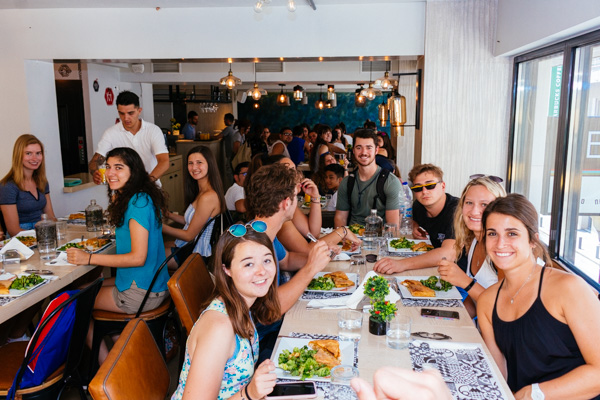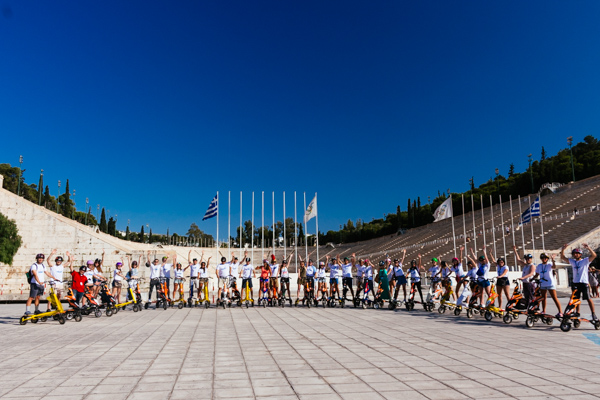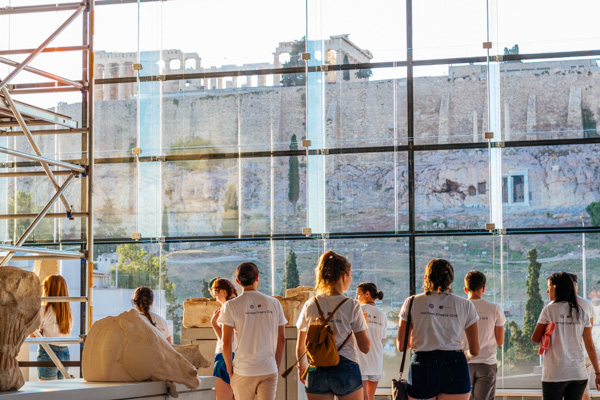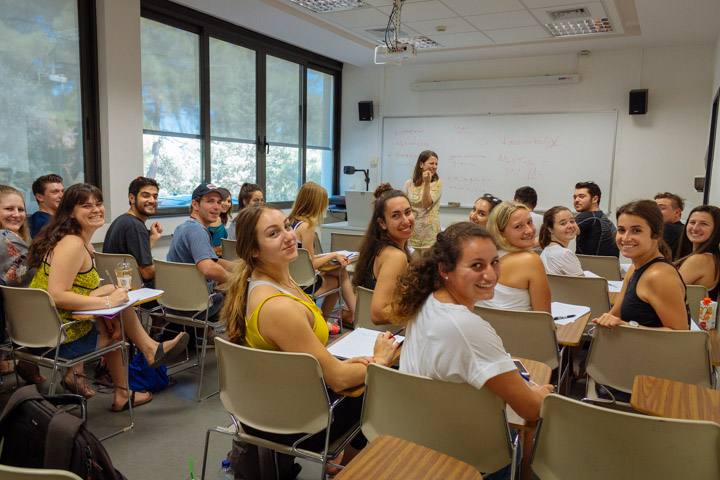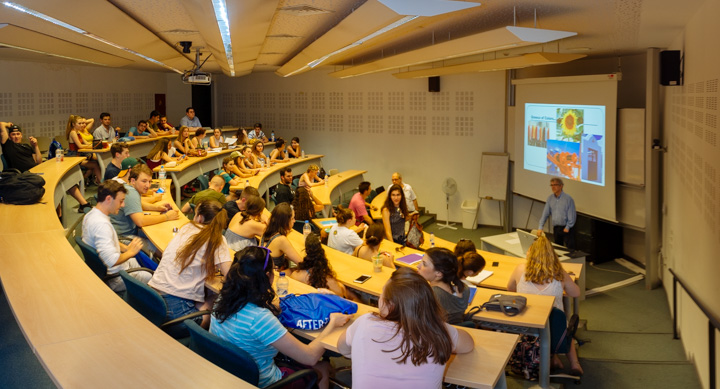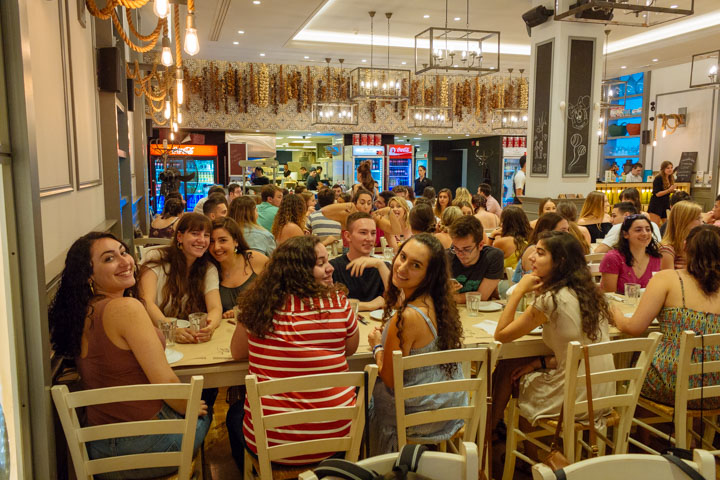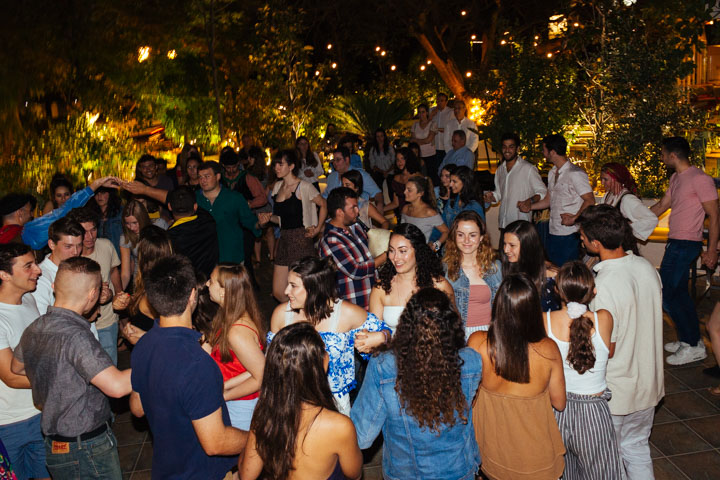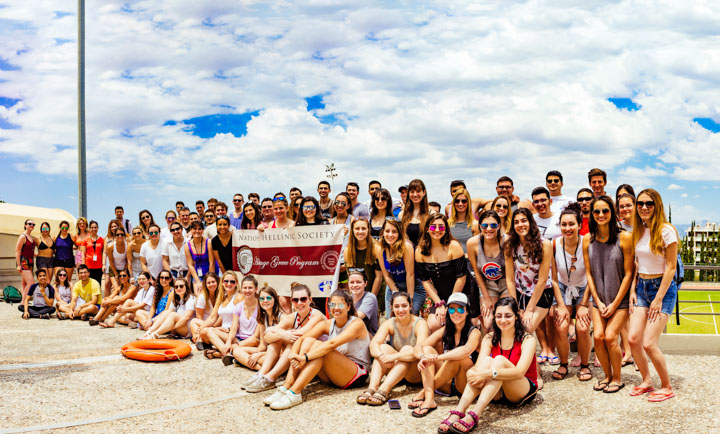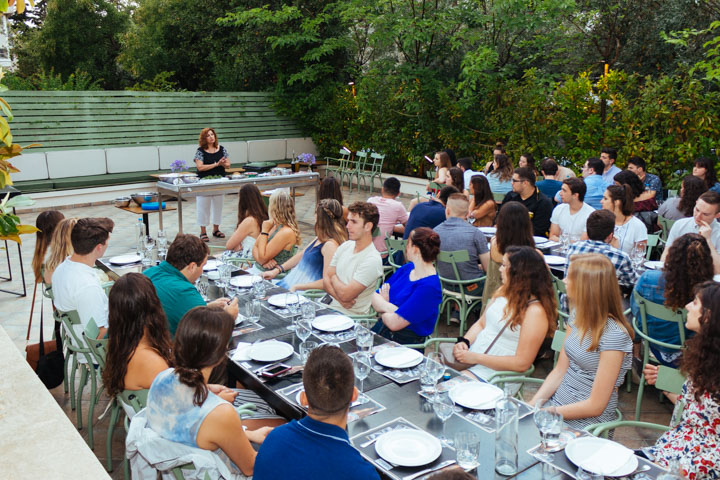From Temple to Temple; Part 1
Today was the day. Participants couldn’t be more excited. It was time to visit two of the most important temples in Attica; the Parthenon and the Temple of Poseidon, at Cape Sounio.
While one group spent the day at the Acropolis, the other didn’t sit idle. They went to see a temple of their own! They travelled to the most southern point of the Athenian peninsula, to the Temple of Poseidon, at Cape Sounio. Check back tomorrow to read about the Cape Sounio experience!
Excitement was all around despite the early start. Talks of history could be heard on the bus as the group travelled through the center of Athens. It’s not every day that you get to go up and personally see the beacon of Democracy. Situated in the center of Athens, the Parthenon is visible from everywhere and offers an amazing 360-degree view of the city. A reminder that no matter how many years may pass, history and progress are tied hand in hand. Kyros Vergados was particularly taken aback. “Each time I have visited the Acropolis I have felt an overwhelming sense of pride for my heritage, knowing that we have created masterpieces such as the Parthenon that have lasted centuries of celebration and turmoil. It is a sight that will never cease to be a symbol of Greek strength, pride, and beauty.”
Fun fact: In Athens, by law, no building is to be built taller than the Parthenon!
Descending from the Acropolis through the archaeological site, the group ended up walking through the picturesque part of Plaka, called Anafiotika. Reminiscent of Greek islands, participants were even more excited about the trip to Andros. Our destination was Deree’s building that houses the Institute of Public health and Institute of Diplomacy & Global Affairs, where the groups had another Greek language class. This time though, they were preparing for the real thing.
Having left the class behind, the group headed to Monastiraki, to Meliartos, where traditional taste meets modern design. The participants practiced their Greek by ordering coffee, to everyone’s delight, and had a delicious lunch consisting of traditional Greek pies.
With bellies full of food, and heads full of fresh knowledge, the participants headed back towards Deree’s campus, to attend a lecture by Dr. Alexander Kitroeff, an Associate Professor at the Department of History, Haverford College, on “What it’s like to be Greek.” He introduced the group to the Benaki family, and their contribution to the preservation of Greek culture through the Benaki Museum. As Greeks of the diaspora themselves, their motives, actions, and love for Greece resonated with the participants.
Dr. Kitroeff then showed the group part of the documentary “The Journey. The Greek American Dream”, which struck very close to home for the participants, as the stories of Greeks leaving for the United States was indeed their own. Talking to the participants afterwards, one could see that each one was affected differently by the discussion and documentary.
Mary Jacobsen passionately said that “the topic of Dr. Kitroeff’s talk about “What it means to be Greek”, filled my heart and brought me to tears. The traditions and values we still follow carry out into our everyday lives, which in turn creates an amazing community. The discussion we had after was brief but very impactful. I couldn’t be happier to be at Heritage Greece connecting with other people my age with similar family heritages.”
The range of emotions in the room was amazing. Harrison Dulgarian was “really touched about Dr.Kitroeff’s explanation of the exhibit on the Armenian Genocide at the Benaki Museum. I am a half Armenian, half Greek American whose family escaped the genocide and fled to America in 1915. It’s our duty to recognize and fight for the Greeks and Armenians who were slaughtered by the young Turks in the Pontiac and Armenian Genocide. […] Dr. Kitroeff said (in regards to the Greek brain-drain) the “best don’t leave, the ones who leave become the best.” My pappou left for America in 1959 with 8 dollars in his pocket. He created a name and a life for both himself, and his family. He has now turned that 8 dollars into financial support for over 50 people in America and Greece.”
Being a scholar of the matter herself, Sophia Keller immediately knew what Dr. Kitroeff was talking about regarding community growth. “I thought Dr. Kitreoff’s presentation and documentary were in agreement with my research in that Greek-Americans thrive when gathered in a community, and that sense of community can be represented by garments and jewelry as well as many other means. Additionally, it made our current trip seem particularly appropriate as we are gathered together in a community, Greeks and Greek-Americans, supporting and uplifting each other.”
For others, such as Michael Taormina and Evan Goodson, the discussion on family, Church and community particularly touched them. “The thing that jumped out at me most was when they were speaking about how it basically runs in the family to make sure that someone’s daughter or son lives a better life then they did,” said Michael. “I think it is so accurate because I feel that my parents did that with me and I would want to do that for my kids.”
On a similar note, Evan commented on how important the local Orthodox Community is. “Being a proud Greek American, from the south, community has always been important to me. The churches are the glue for the παρέα in America, from coffee hour, to GOYA, and summer camps, churches have held together communities for many years now. What stuck out to me the most, was this phrase from the documentary and following discussion.
“When I (parents) die, you will be able to go to the church, and find people like me. You will never be alone.”
This sentence, though simple, carries a lot of weight! When our elders pass on, we will still have the Greek Orthodox Community to guide us and steer us correctly.”
At the end, Dr. Kitreoff said that “it was a great pleasure and an honor to be able to show this DVD, which is about Greek-Americans, to a bunch of Greek-American kids who are visiting Greece and are experiencing pride in Greece, talking about the pride that Greek-Americans have about their culture.”
The inspiring day ended with dinner at a local ταβέρνα (restaurant), with everyone rejoicing in each other’s company.
Join us tomorrow as we explore the Temple of Poseidon at Cape Sounio!
Smile! You’re at the Parthenon.
An amazing blend of traditional cuisine and modern design at Meliartos.
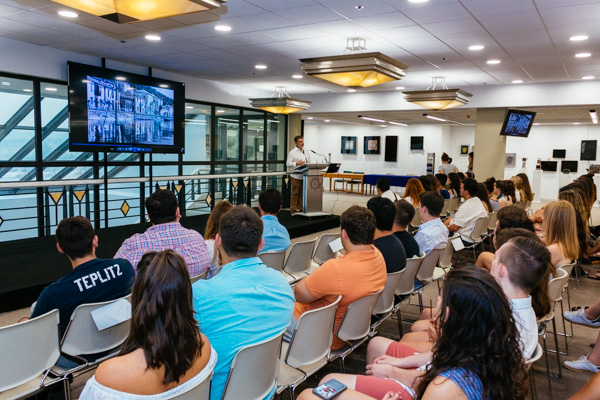
Dr. Kitreoff talks to the participants about what it’s like to be Greek.
Where is the Acropolis?
Every country has landmarks. But what about a landmark of global importance?
Stood atop the Athenian Acropolis, the Parthenon is a reminder of the golden age of Athens; democracy, philosophy, arts and sciences all flourished in 5th century BC, evident even to today. Fundamental to western thinking, this classical age inspired the Renaissance, the effects of which can still be felt.
But before going up and seeing the monument itself, one must learn about it to even be able to appreciate its meaning. What better place to do so, than the new Acropolis Museum.
Situated in Plaka, it’s a modern architectural marvel which stands directly opposite the classical marvel. Noah Duclos, while initially skeptical about the design, later came to appreciate it. “I thought at first that the modern architecture was very jarring compared to the ancient, but after exploring the museum and learning about how the architect designed the museum to reflect the style of the Parthenon, I was much fonder of it. […] Being right next to the Acropolis itself and with excellent views of the monument, the care that was taken to respect the past and make it accessible to the present, was remarkable.” Built to house all the ancient artefacts unearthed in the archaeological dig surrounding the Parthenon, its three floors offer a deep insight to the rich history of the area.
Amazed by the museum, the participants couldn’t be more excited as they explored, discovering new links to their heritage at every turn. Christopher Nacopoulos found that “the museum is an impressive exhibition that highlights many aspects of the history of Greece. I grew up learning about all the different art and sculptures of Greece in various Greek culture and history classes. It was very interesting to view and analyze the intricate pieces on display.”
The participants were split in to two groups for the day. While one group visited the museum, the other went on an alternative tour. How you may ask? On scooters! Thanks to Scooterize, they had a unique tour of the historical city center. Zipping around, they were astonished at the vibrancy of the metropolis.
Noah thought that “It was a bit scary to begin with! But once I got the hang of it, it was a blast!” while Christopher saw it as an opportunity, “the scooters were super fun to ride, and the quick trip featured many beautiful sites.”
Seeing Athens in this splendid summer afternoon, was an incredible experience for both participants, that got them thinking. For Noah, his expectations were met. “In some ways, it was exactly what I expected. An ancient city with so much history, but still a modern urban hub with a thriving culture. I loved it,” while Christopher compared it to other countries. “I love how Athens still has its Ancient Greek charm. Athens deceptively looks like many other European cities, but a simple turn of the head reveals the classic, detailed architecture and the ancient ruins that differentiates Athens from any other cities.”
With this first introduction to Athens out of the way, now it’s time for the real deal. Tune in tomorrow to find out about the trip to the Parthenon!
Back to School
Who said learning can’t be fun?
To get around Greece, participants will need to know the basics – both lingually and culturally. That’s why participants will attend Greek language classes and Culture Seminars throughout the span of the program.
Today, the participants split in to two groups, Beginners and Advanced. Over the course of the next two weeks, they will learn Greek, enough to get them around and enhance their existing knowledge. David Lilla, although he did not know any Greek, was fascinated. “I think Greek, as a language, is very unique. Being someone who doesn’t speak Greek, I’ve found that some words are similar to English and some completely different. Our classes have definitely helped me recognize common phrases, allowing me to better communicate with the locals.”
Knowing the language though is one half of the equation. They need to also know the context in which Greek culture was created. That’s why Dr. Gregory Katsas, a professor of Sociology at Deree, presented what modern Greek culture is.
He started by asking the participants, “What do you want to learn?”, to which the participants responded with a flurry of questions, ranging from history, ancient and modern, to the recent crisis and how modern Greek culture was affected by it. Before anyone knew it, the two-hour lecture was over. Everyone left wiser, Greek and Greek – American culture better defined in everyone’s mind. Dr. Katsas shed light on every day, mundane things, such as why Greeks love their coffee and spend so much time appreciating it.
An integral part of a Greek culture is the infamous souvlaki. The participants were treated to their first souvlaki, at a local restaurant called Tsi Tsi. Influenced by the Dr. Katsas’ Greek Culture Seminar, George Costidis, was intrigued by the differences between the two countries. “Culture in Greece is different to culture in America. People here are much more willing to enjoy the company of others, sitting at the cafe for hours even after they have eaten their food or drank their coffee. Growing up in America leads you to believe that life is meant to me lived fast, with no tolerance for anybody or anything that slows them down. But in Greece, you are expected to slow down and enjoy life.”
Culture comes in many ways and forms. From every day interactions, to ancient artifacts. Join us tomorrow as we delve into the ancient Greek world, through one of the most unique museums in the whole of Greece. The Acropolis Museum. Stay tuned!
Every journey starts with a step
The time has come! Heritage Greece 2018 is finally here. In the days leading up, excitement has been palpable. With 65 Greek – Americans eager to discover their roots, learn about their heritage, and experience Greece like never before, it’s going to be a two-week adventure they will never forget!
Even though the journey from the States to Greece lasted many hours, it was a fantastic opportunity to meet each other. With friendships quickly establishing on the flight, all they could talk about was what they were going to experience. For Vasiliki Argeroplos, “The flight was really fun; I met a bunch of different people, because I wasn’t sitting next to anyone I already knew coming on the trip. We talked about coming to Greece when we were little to see our yiayia and our Greek proficiency levels, since some people knew Greek and some didn’t.”
Upon touching down, everyone loaded up in to two coaches, and officially started their Heritage Greece adventure!
First, everyone settled in at the new ACG residences, situated in the beautiful neighborhood of Aghia Paraskevi, a suburb right on the outskirts of Athens, just at the bottom of mount Hymettus. The participants were treated to a buffet dinner where they met with the program coordinators and their ACG peers; Deree students who volunteered to show the best Greece has to show. Smiles, excitement and tzatziki!
On Sunday, the plan was to quickly get them acquainted with the neighborhood and Deree’s campus. First things first though. It had the ideal weather to spend a day at the ACG swimming pool, to shake off that jet lag. With its beautiful view of Athens, the participants got a taste of what’s to come and were excited for the coming weeks.
Later in the evening, to wet their appetite before dinner at the wonderful Κήπος (Garden), Diane Kochillas, star of “My Greek Table” presented a Greek Cooking Masterclass. The taste and smell of freshness took them aback! Isabella Vliss loved the Masterclass, as “Watching her cut the tomatoes reminded me of my grandma who would make my brother and I fresh Greek salad after swimming in the ocean when we were young.”
After the masterclass, Deree’s Vice President of Enrollment and Administration, Dr. Dimitrios Andreou, and Dean of Students, Dr. Matilda Chatzipanagiotou, warmly welcomed the participants to Greece and to The American College of Greece on behalf of the College’s President, Dr. David G. Horner. They wished that the participants enjoy their stay in Greece, hoping that strong and long-lasting relationships be formed, both between participants and peers, but also to Greece.
What followed next was, indeed, close to their heart. The Lykeio Ellinidon showed them Greek dances, taught them a few and even danced with them! Founded in 1911 by a major figure of Greek feminism, Kalliroi Parren, today it aims to preserve traditional Greek Culture.
Pleasantly surprising everyone with his skill, Evangelos Goodson stood amongst the dancers with his γκάιντα (bagpipe), playing music that everyone danced to.
The participants weren’t phased by the new dances. This is what they had been practicing for back home! Georgia Kollias was enthusiastic about the experience. “Having danced with the Pan Macedonians in Philly, I felt extremely proud to be able to represent Greek Americans within the Greek dance community and to learn some new Icarian dances. When we were dancing, I felt passionate about my heritage – at that moment I felt as though I truly connected with my Greek roots.”
With the first weekend over, a wealth of activities awaits the participants in the following days. Check back every day for the latest news!
Blog editor and photographer: James (Dimitris) Voutsas

